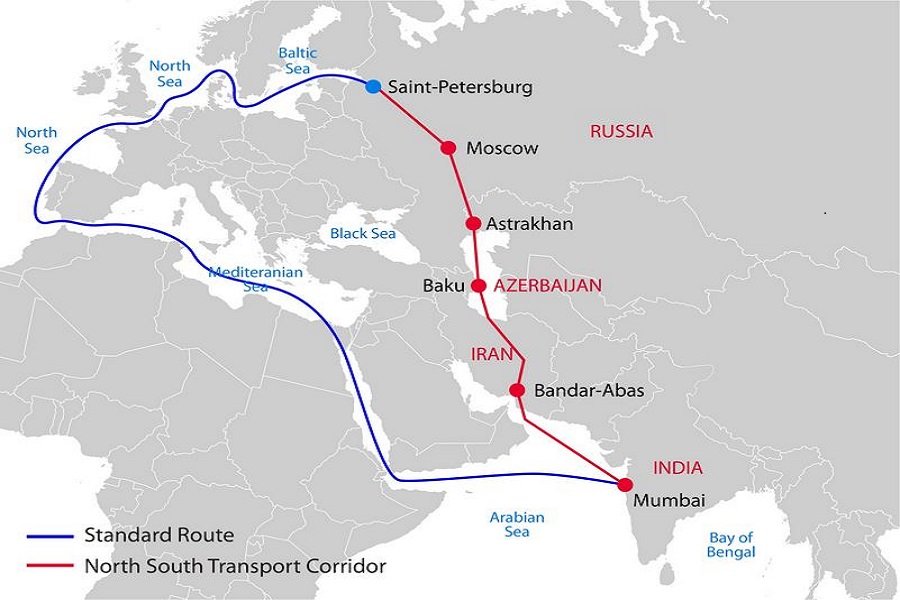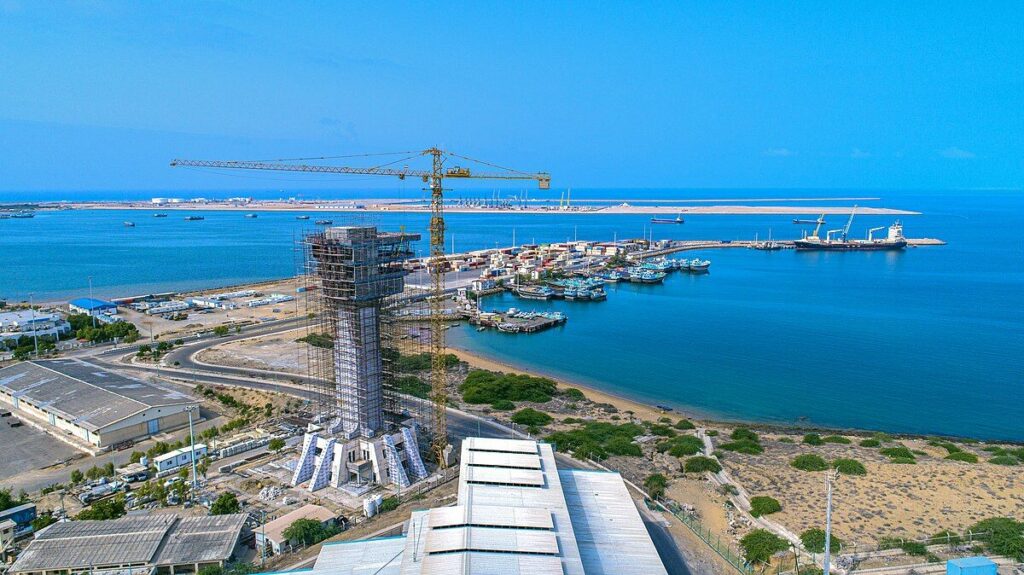Review of Afghanistan developments
The extension of the Chabahar Port exemption by the United States occurs at a time when relations between Tehran and Washington are at their most strained, On the other hand, ،There is a tense atmosphere exists in the relations between Delhi and Washington. This situation presents one of the ambiguities in international politics. Why did the Trump administration, which aims to impose maximum sanctions on Iran, choose to extend the exemption for this crucial economic and strategic point? If the intention is to assist India, why has the duration of the Chabahar Port exemption been limited to only six months? This note seeks to clarify the rationale behind this contradictory action by the US and the questions it raises.
The most important reasons for extending the Chabahar Port exemption
Maintaining India’s position within the sphere of collaboration
To begin with, the rationale behind this should be examined from a geopolitical standpoint. The primary justification for this action is that Washington has prolonged the exemption for Chabahar Port, enabling India to persist with its long-term connectivity projects and investments in the port, which are crucial for accessing Afghanistan and Central Asia. This action represents a “diplomatic concession” aimed at countering Chinese proposals and influence over India. The visits by Chinese and Indian officials to Delhi and Beijing, along with the discussions between Modi and Ping at the BRICS summit, reflect the resolve of both nations to improve their relations, which, if successful, would not bode well for Washington. Consequently, the extension of the Chabahar Port exemption serves as a mechanism to sustain the alignment of US and Indian policies in the region. In the realm of US foreign policy, exceptionalism is frequently employed to ensure that allies remain within the sphere of cooperation.
Distrust towards Pakistan
In light of the deteriorating relations between Delhi and Washington, alongside the improving ties between Islamabad and Washington, American officials recognize that they cannot rely on a unique strategic partnership with Pakistan. This is due to Pakistan’s status as a strategic ally of China and its hosting of the most significant project under the Belt and Road Initiative, namely the China-Pakistan Economic Corridor (CPEC). Conversely, the military and security collaboration between Beijing and Islamabad is more profound than it may initially appear.
All the aforementioned factors, along with Islamabad’s self-serving approach, have likely led the Trump administration to conclude that it cannot rely on Pakistan in the long term and, therefore, must continue its collaboration with India. Consequently, Washington has opted to maintain its strategic partnership with Delhi. Naturally, it is important not to overlook the signals from Delhi; recently, several Indian refineries have begun to decrease their acquisitions of Russian oil in response to Washington’s sanctions against Moscow’s leading crude oil exporters, Rosneft and Lukoil.
Chabahar serving as a balancing tool
Chabahar serves as the sole competitor to the Chinese-supported port of Gwadar. Additionally, it plays a significant role in the North-South Corridor, potentially challenging aspects of China’s Belt and Road Initiative. By prolonging the exemption of Chabahar Port from sanctions—albeit in a regulated manner—the United States is facilitating opportunities for regional adversaries of China, specifically India and Russia. Consequently, Chabahar Port functions as a counterbalance to Chinese endeavors in the area, particularly Gwadar Port and the Belt and Road Initiative.
Averting the fall of Central Asian countries and Afghanistan within the CPEC initiative
Islamabad and Beijing are eager to broaden the China-Pakistan Economic Corridor to include neighboring countiries. The recent trilateral meeting involving China, Pakistan, and Afghanistan suggested that Afghanistan become a part of the corridor, a proposal that was positively received by Kabul. Following Afghanistan’s inclusion in the corridor, it is anticipated that Pakistan will seek to extend CPEC into Central Asia. This development will further integrate these five nations into China’s strategic initiatives. Consequently, the extension of the Chabahar Port exemption presents an opportunity for these five countries to have alternatives for accessing open waters, rather than relying on a single route.

Key facts about Chabahar Port
Chabahar Port is situated in Iran’s Sistan and Baluchestan Province along the Gulf of Oman, close to the entrance of the Strait of Hormuz. The project encompasses two ports, namely Shahid Kalantari and Shahid Beheshti. Chabahar serves as Iran’s sole deep-water oceanic port, offering direct access to the Indian Ocean. Additionally, Chabahar Port is approximately 170 kilometers to the west of Pakistan’s Gwadar Port, which is currently being developed by China as part of the China-Pakistan Economic Corridor (CPEC).
The port offers direct access to Afghanistan and Central Asia, circumventing Pakistan, and serves as a crucial hub in the International North-South Transport Corridor (INSTC) that links India to Iran-Caspian Sea-Russia-Europe, thereby enhancing India’s maritime connectivity and energy security within the Indian Ocean region. On the other hand, Chabahar Port functions as a counterbalance to China’s Belt and Road Initiative (BRI) and Pakistan’s Gwadar Port, which is part of the China-Pakistan Economic Corridor (CPEC), and serves as a vital component of India’s “Connecting Central Asia” and “Enhancing Neighborhood” strategies.
In 2005, India and Iran came to an agreement regarding the development of the port. In 2015, both nations signed a memorandum of understanding aimed at developing the Shahid Beheshti terminal located in Chabahar. In 2016, a trilateral agreement was established among India, Iran, and Afghanistan to form an international transport and transit corridor via Chabahar.
In 2018, despite the sanctions imposed by the United States on Iran, the US provided India with a waiver for the Chabahar port, acknowledging its significance in aiding Afghanistan’s development. However, this exemption from sanctions for the Chabahar port was rescinded in September 2025. Currently, a six-month waiver from US sanctions, effective from October 2025 to April 2026, permits India to continue operations at the port without any disruptions.
The strategic significance for Delhi
It is important to highlight that Chabahar port holds significant strategic value for India’s objectives in Central Asia and the Caucasus. This port enables India to engage in trade with Afghanistan and Central Asian nations without the necessity of transiting through Pakistan, thus minimizing both time and expenses for Indian exporters. Furthermore, Chabahar’s proximity to Pakistan’s Gwadar port enhances India’s strategic stance in the area and offers a geopolitical counterweight to the involvement of China and Pakistan.
All of the aforementioned suggests that India is unlikely to relinquish its hold on Chabahar Port, given its significance. It is important to highlight that Oman and Kazakhstan have recently entered into an agreement to foster trade focused on this port, which demonstrates that other nations are not complying with the sanctions imposed by Washington.
Read more…
An Analysis of India’s Special Envoy Visit to Afghanistan
Feasibility of Increasing Iran-Afghanistan Trade to $10 Billion
Conclusion
In recent years, India’s foreign policy has been structured to foster closer ties with Washington, positioning the country as a key component of the US strategy to mitigate Beijing’s influence in the Indo-Pacific region. Despite the current tensions in India-US relations, both nations continue to prioritize each other in their foreign policy agendas, driven by their mutual strategic necessities.
The United States has extended the exemption for Chabahar Port for various reasons that align with the ongoing strategic relations with Delhi, as well as to counter China’s influence. Additionally, the strategic mistrust towards Pakistan and the need to avert the destabilization of Central Asian nations and Afghanistan within the framework of the CPEC initiative are further justifications for this decision. Nevertheless, it is important to note that the extension of the Chabahar Port exemption is a tactical measure, and there exists a possibility of its revocation should the circumstances change. These circumstances are influenced by the actions of India, Pakistan, Afghanistan, and the Central Asian countries.

















